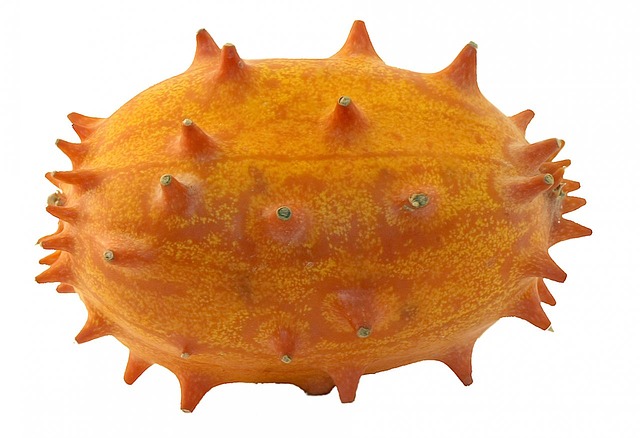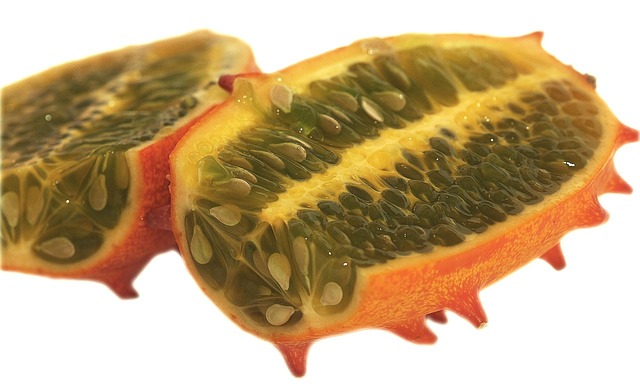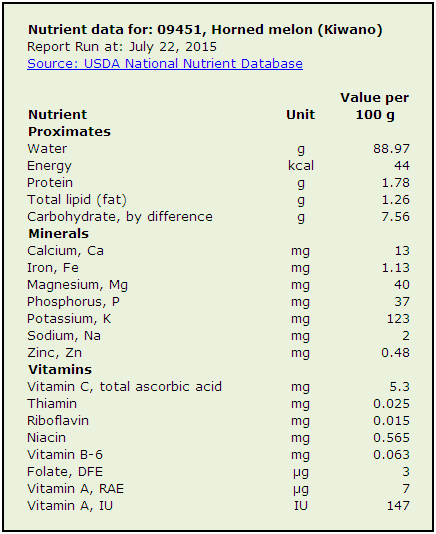Horned Melon (Kiwano): Origins - Consumption - Nutrition Facts - Health Benefits
|
|
|
Contents
- Geographic origin and regions grown
- Common consumption today
- Nutrition Facts: Vitamins, minerals and phytochemical components
- Health Benefits: Medicinal uses based on scientific studies
- Bibliography
Geographic Origins and Regions Grown

If you are trying to find something fun for you and the kids or a novelty to surprise your co-workers, try putting this crazy melon in your packed lunch for the day! Sometimes referred to as the African horned cucumber, melano, kiwano (because of its resemblance to kiwifruit) or hedged gourd, the horned melon will certainly put you on the list of adventurers at the lunch table.
The horned melon is a vined plant, much like the pumpkin. This particular melon, however, is found most frequently in its place of origin: the Kalahari Desert in Africa. This unique fruit came across to California, as well as to New Zealand, and hopefully will hit the supermarkets of America fairly soon, though with its bland taste it is unlikely to be well received. You can expect it to be costly when found in supermarkets though, since it is grown in so few places currently and is mostly grown as an ornamental fruit.
This unique fruit does not stop at its horned oval shape, however. It is difficult trying to picture a large number of these together at once like in a supermarket produce section. Also surprising is the leaves and stems: they have hair! Imagine seeing one of these grown to giant sizes like the pumpkins of today.
Although it is possible for this fruit to be picked by hand, you should make sure to let it ripen to its full extent, where it appears orange and slightly bumpy, and where the yellow and green gelatinous pulp is filled with seeds like cucumbers, which it is a relative of. It is often compared to a pomegranate or passion fruit because of the pulp with numerous edible seeds.
Common Consumption Today

Yes, this fruit looks like a scary little puffer fish, but I promise that it will not bite. Horned melons, like any respectable melon, are edible and eaten raw for the most part. With some sugar sprinkled on it, it’s a taste of heaven, though some would argue that it is tasteless or bland and that the tough fibrous seeds make it unpleasant. The fruit is said to taste like a mixture of cucumber and kiwifruit with mild flavor, but it mimics the flavor of banana when it is fully ripened.
Once you get the nerve to break into the middle of this melon, you’ll find that the seeds are also edible. If you’ve gone that far, you might as well go the extra mile, right? A good way of serving horned melon is peeled and sliced in a fruit salad or as a side dish along with roasted meat.
It does not keep well when stored in the refrigerator, so like most tropical fruits, it is best when kept at room temperature. When stored at room temperature, horned melons can keep for more than three months, making them an excellent ornamental fruit. As an extension of their ornamental use, the horned melon is often cut in half and after the insides are scooped out and discarded, the beautiful shell is used as a serving bowl.
In its native region in Africa, the horned melon is eaten as a supplement, rather than as fruit like a banana or apple. This is due to the low sugar content, lack of acidity and aroma. But in some regions, it is being cultivated with an attempt to increase these positive attributes to make it marketable as an edible fruit.
Nutrition Facts: Vitamins, Minerals and Phytochemical Components
So, what’s a melon good for? You guessed it, iron. This melon contains three times as much as iron as that of a watermelon. It also has high levels of vitamin C along with some vitamin A, calcium and of course fiber.
If you have heard that bitter melons are toxic, that is not incorrect. Historically, horned melons contained cucurbitacines, a bitter phytochemical that is toxic to animals and man. But here’s why you can now eat them: recent cultivars of the fruit have been bred to be cucurbitacines free, so the fruit is no longer toxic.
Full nutrition facts are seen in the table below:
Health Benefits: Medicinal Uses Based on Scientific Studies
If you want to use a natural food to treat an iron deficiency, this melon can help. All of the symptoms that accompany anemia like fatigue, overall weakness, and a weakened immune system can be treated with iron (1).
It is known that horned melon was used a natural supplement by the locals in Africa where it was originally grown. But there is currently no scientific documentation of what the fruit is a supplement for, so we can only assume it is considered a supplement due to the high iron and vitamin C content.
The seeds are ground up, mixing with water and ingested to kill tapeworms and parasites (2). After the seeds are used to kill the worms, it is necessary for the affected person to purge in order to expel the dead worms. There are no other published scientific studies showing the medicinal benefits of horned melon, but as its popularity increases we can soon expect to see such studies conducted.
Bibliography
1. St. Lifer, Holly (2005). A taste of the exotic. Oxygen Magazine #68, pg. 102
2. Chiej, Roberto (1984). Encyclopaedia of Medicinal Plants. MacDonald Encyclopedias
Disclaimer
Nutritiousfruit.com provides this website as a service. Although the information contained within the website is periodically updated, no guarantee is given that the information provided is correct, complete, and/or up-to-date. The materials contained on this website are provided for general information purposes only and do not constitute legal or other professional advice on any subject matter. Nutrtiousfruit.com does not accept any responsibility for any loss, which may arise from reliance on information contained on this website. The information and references in this website are intended solely for the general information for the reader. The content of this website are not intended to offer personal medical advice, diagnose health problems or to be used for treatment purposes. It is not a substitute for medical care provided by a licensed and qualified health professional. Please consult your health care provider for any advice on medications.
Didn't find what you were looking for? Search here...

Amazon Search Box:
Did you like this page?
|
|
|





